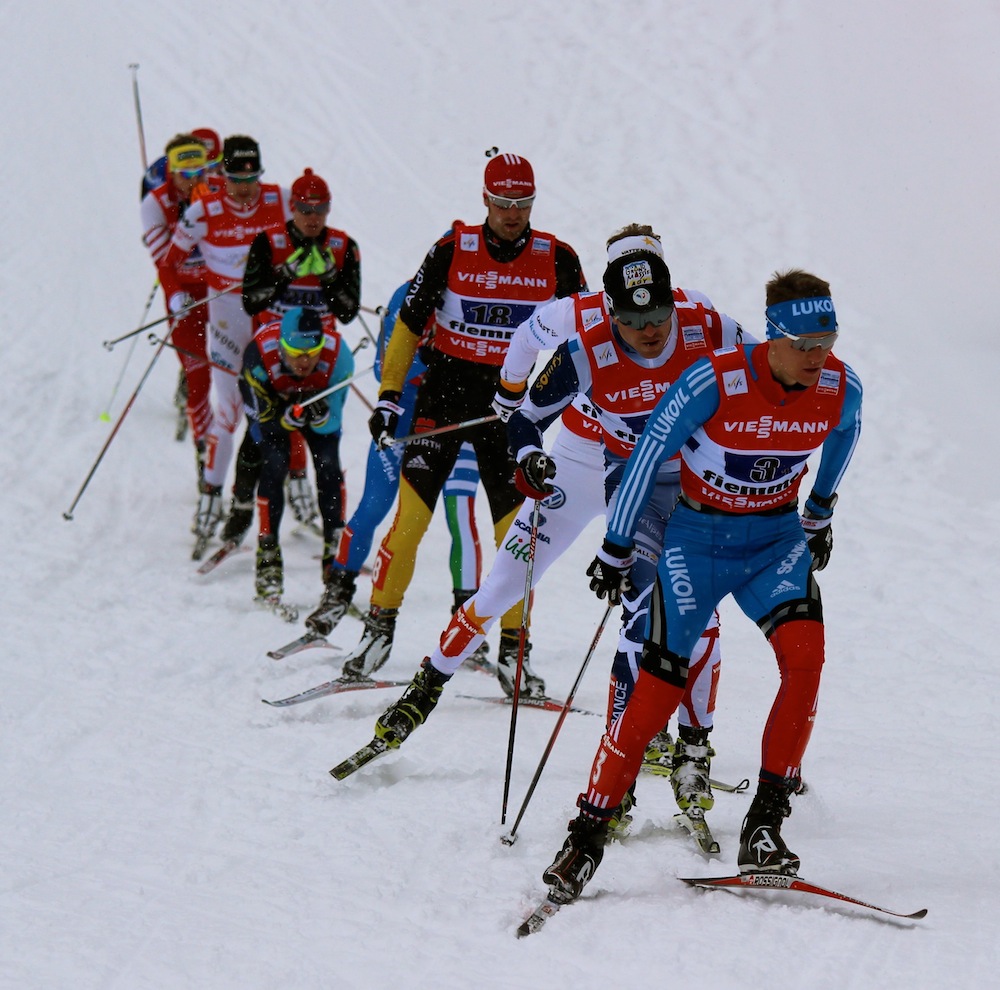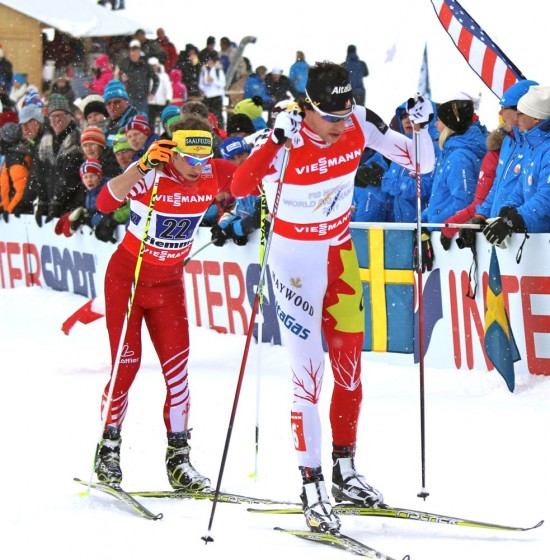
FasterSkier’s coverage of the 2013 FIS Nordic World Ski Championships in Val di Fiemme, Italy, is brought to you by the generous support of Fischer Sports.
VAL DI FIEMME, Italy – If cross-country skiing were a betting sport, which it is in some circles, you’d be a fool not to pick Nikita Kriukov for a sprint win after his performances in two races at the 2013 Nordic World Ski Championships.
A 2010 Olympic sprint champion, the smiley Russian proved again Sunday he’s a force to be reckoned with in any short-distance discipline – skate or classic – after winning Friday’s individual classic sprint for his first World Championship gold and repeating the feat Sunday with teammate Alexey Petukhov in the 6 x 1.5-kilometer freestyle team sprint.
The two didn’t make too much of a splash in the semifinals, finishing fourth about 2 ½ seconds behind Sweden in first, and Kazakhstan and Italy, respectively, to qualify for the finals with a fast-enough time.
The defending world champs in the classic team sprint, Canada’s Devon Kershaw and Alex Harvey won Sunday’s first semifinal, which was about five seconds faster, edging Belarus by 0.04 seconds and Germany by 0.2 to advance.
Ten teams met in the final, where Russia made a point to get ahead early. Petukhov started off by challenging Sweden’s Marcus Hellner up the first climb. Over the top, Hellner took the lead and Petukhov settled in with a long, single-file train behind him. Kazakhstan’s Nikolay Chebotko and Tim Tscharnke of Germany were next in line, followed by France’s Jean Marc Gaillard and Kershaw in sixth.
Throughout the next five laps, the Russians remained close to the front, mostly behind Sweden, to ensure they stayed out of trouble. Coming out of the first exchange, the Canadians moved to second with Harvey, who was tagged in fourth, while Kriukov sat in third – comfortably, conserving.

Harvey entered the stadium in second behind Sweden with all 10 teams within two seconds of the lead. Russia came through in ninth, but made its way to the front again by the first ascent out. Meanwhile, Kershaw’s pole snapped in the exchange and he fell to last while free skating to a replacement.
Petukhov pushed the pace through the third exchange, where Sweden, Italy, Germany, and Kazakhstan followed, and Canada hung in sixth. With three laps remaining, the Russians were still in contention – this time behind France’s Maurice Manificat, who attacked on the first hill. Sweden’s Emil Jönsson stayed close in third and Harvey dropped back to ninth.
With one leg to go, Sweden, Russia and Kazakhstan led the tight group of 10, Canada tagged off in eighth, and Petukhov and Hellner proceeded to go at it. Kershaw accelerated into fourth behind Kazakhstan’s Alexey Poltoranin. On the last steep climb, Petukhov attacked, Hellner stayed close and Dusan Kozisek of the Czech Republic charged up the outside to sneak ahead of Poltoranin.
Kershaw sat in fifth and the order held through the last exchange. There, Nikolay Chebotko led out of the stadium for Kazakhstan, Jönsson followed, as did Kriukov and Harvey. Snow began to fall harder, but the pace remained calm – until the final climb. Harvey attempted to pass Kriukov and Jönsson on the outside, but unable to cut in, settled behind the Russian and ahead of Italy’s Frederico Pellegrino.
Into the stadium, Poltoranin had the lead for Kazakhstan, but Kriukov caught Jönsson’s draft, slipping past them both and outdueling the Swede to the finish by 0.46 seconds. For Kriukov, it was his second gold in as many races at World Championships, and for Jönsson and Hellner, their first medal of the week.
Poltoranin managed to hold off Harvey with a desperate lunge in a photo finish, and the Canadians crossed in fourth, three-hundredths of a second from the podium.
“What a feeling; I am really, really happy,” Kriukov said at a post-race press conference. “The snow condition was really heavy and today I try my best and it was hard.”
Following Poltoranin on the last lap, Kriukov was most concerned about Jönsson.
“I know that Emil is very strong and last 50 meters, maybe 20 I beat him,” Kriukov said. “I’m happy that Emil has a silver medal because sometimes on World Championships you have a little problem, and I’m happy for him.”
Jönsson reached over at the press-conference table and patted Kriukov on the shoulder. “Thank you,” he said.
“It was a tough race,” Jönsson explained. “I don’t know how it looked like when you were watching it, but it probably looked like we were going really, really slowly today.”
With soft, heavy snow, the group tried to keep the tempo in control, he said. But it still required a lot of energy, especially if you wanted to stay up front, like the Swedes did.
“It was good for me and Marcus, we were still up in the group all the time, just try to be avoiding all accidents,” Jönsson said. “Our plan was just to be with the other guys in the end and see how it will go and hopefully it will be there [with] other medals.”
For Jönsson, the silver was a career-best at World Championships since placing third in the 2011 skate sprint in Oslo, Norway. For Hellner, it was a good start coming off gold and silver at the 2011 World Championships, in the sprint and 4 x 10 k relay, respectively.
Chebotko said his team set out for a medal, especially in the lead-up to the 2014 Sochi Olympics.
“Our tactic was simply to stay with the Russians and Swedes and try not to stay behind of course,” Poltoranin said through a translator. “In the end, we eventually ended up on the podium and we’re satisfied with that.”
Canada was less enthused, with Harvey wishing he’d been more aggressive at the apex of the last hill.
“I was ahead of Kriukov and I should have cut him off but I’m not aggressive enough,” Harvey said. “It was the same yesterday [in the skiathlon]. A bunch of times yesterday I should’ve been cutting people off but instead I gave in too much. … I’m not like a sprinter.”
This is coming from someone who won bronze in Thursday’s classic sprint. Despite feeling good on Sunday, Harvey said he simply wasn’t in a good enough position before the finish. As he tried to catch Poltoranin, he found himself off-balance and couldn’t outlunge him to the line.
“It’s disappointing,” Harvey said. “At a championship, fourth doesn’t mean anything. It’s about the top three.”
Kershaw looked down at the ground as he expressed similar emotions.
“We came here to defend the title and we were well short of that,” he said. “But [ugh] there’s the Olympics next year.”
Despite early pole trouble on his second leg, Kershaw said it fortunately didn’t make a difference.
“I had to ski one lap with a bad pole, but that’s fine. I came back on it after that,” he said. “It is what it is, I guess. I felt really good today though, so I think that’s a step in the right direction.”
After failing to qualify for the sprint heats on Thursday, Kershaw said he wasn’t sure if he’d be able to compete in five races as he’d hoped with lingering stomach problems. On Sunday, he said he was looking forward to the relay as long as the rest of his teammates – Ivan Babikov and Lenny Valjas – were feeling better.
“We’ll be there for the relay,” Canadian head coach Justin Wadsworth affirmed. “The guys skied well and it was close. Alex said he got caught a little bit back and it’s so hard, even though you don’t want to be leading necessarily, you’ve got to be up in front of the group, but they skied well. … It was a good race, it was close.”
Alex Kochon
Alex Kochon (alexkochon@gmail.com) is a former FasterSkier editor and roving reporter who never really lost touch with the nordic scene. A freelance writer, editor, and outdoor-loving mom of two, she lives in northeastern New York and enjoys adventuring in the Adirondacks. She shares her passion for sports and recreation as the co-founder of "Ride On! Mountain Bike Trail Guide" and a sales and content contributor at Curated.com. When she's not skiing or chasing her kids around, Alex assists authors as a production and marketing coordinator for iPub Global Connection.



